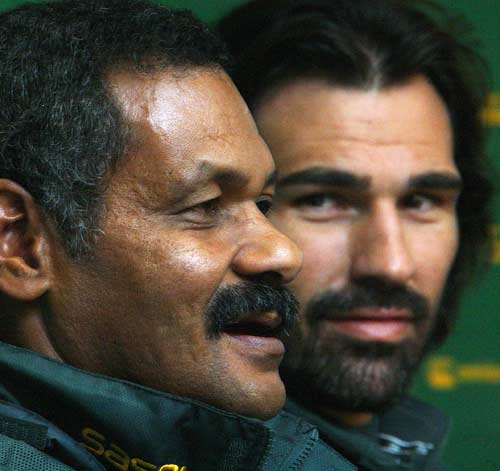Springboks under fire from IRB

Your support helps us to tell the story
From reproductive rights to climate change to Big Tech, The Independent is on the ground when the story is developing. Whether it's investigating the financials of Elon Musk's pro-Trump PAC or producing our latest documentary, 'The A Word', which shines a light on the American women fighting for reproductive rights, we know how important it is to parse out the facts from the messaging.
At such a critical moment in US history, we need reporters on the ground. Your donation allows us to keep sending journalists to speak to both sides of the story.
The Independent is trusted by Americans across the entire political spectrum. And unlike many other quality news outlets, we choose not to lock Americans out of our reporting and analysis with paywalls. We believe quality journalism should be available to everyone, paid for by those who can afford it.
Your support makes all the difference.South Africa’s coach and captain are under fire from the International Rugby Board (IRB) for their criticisms and questioning of referee Matt Goddard in last Saturday’s Cape Town Test.
Comments by coach Peter de Villiers and stand-in skipper Victor Matfield’s questioning of the Australian official’s decisions during the match have angered IRB chiefs.
De Villiers complained in a post-match television interview about match officials, claiming they were being wrapped in cotton wool. He then re-iterated his criticisms, 24 hours later. Talking of the refereeing interpretations in this season’s Tri-Nations Championship, the Springbok coach said “It is very difficult for us to live with what has been dished out to us.”
But the IRB have taken a dim view of such comments. They were also furious to see Matfield constantly questioning Goddard’s decisions and arguing with him. They warned they will take steps to “stamp it out”.
IRB referee supremo Paddy O’Brien said it was “very disturbing” that De Villiers was making such comments. “All the countries have been invited, after each match, to put a report forward on every referee where they have got concerns.
“Countries like England, Wales, Argentina and many others have all spent time after games submitting very mature reports. That is very valuable to us.
“However, I have yet to hear from the South Africans all season. There is a medium to go through and that is me, but I have no sympathy for a coach that wants to go through the media rather than me.
“I will be meeting Peter (de Villiers) later in the month and if he has any grievances he will have a chance to bring them to me.”
O’Brien said that referees should not be open to public enquiry after every game. They were reviewed by him and an independent performance reviewer. And, hinting perhaps that De Villiers had cast aspersions at the referee to mask his own team’s three defeats in four Tests in this Tri-Nations, O’Brien said “They (the referees) should not be open to public enquiry just because coaches have their own agenda.”
In a hard hitting response, O’Brien also criticised the Springbok captain, suggesting that another motive may have been behind his constant questioning of the referee’s decisions at Newlands. The New Zealander said “Captains don’t have the right to question decisions. But Matfield was questioning almost every one and arguing.
“Matt Goddard’s lack of experience counted against him; he should have stopped it. It’s disturbing to see players disputing every decision. They can’t do that. They are delaying the opposition and in a lot of cases it is done deliberately to slow the opposition down. It’s got to be stamped out.”
However, O’Brien did admit that referees had not been tough enough with players lying all over the loose ball in this Tri-Nations. “I agree we have to be tougher. We would like to see referees be a lot stronger in taking more sanctions against repeat offenders. Otherwise, the players will say to themselves, ‘This is great, we can get away with this’.
“But the teeth the law has got is the option of a yellow or red card to sanction people that won’t comply. You go from a penalty to a yellow card to make sure the laws work. Otherwise, teams will keep doing this all day.”
O’Brien said that it should be remembered, the ELVs were new to both players and officials. It was, he thought, quite hard to change the officials’ mindset. But they would be reminded of their responsibilities in this area, he promised.
“I will be talking to the referees before the remaining games. At the moment, I think the referees are struggling with moving from free kicks to penalties. A stronger message is needed.”
Join our commenting forum
Join thought-provoking conversations, follow other Independent readers and see their replies
Comments